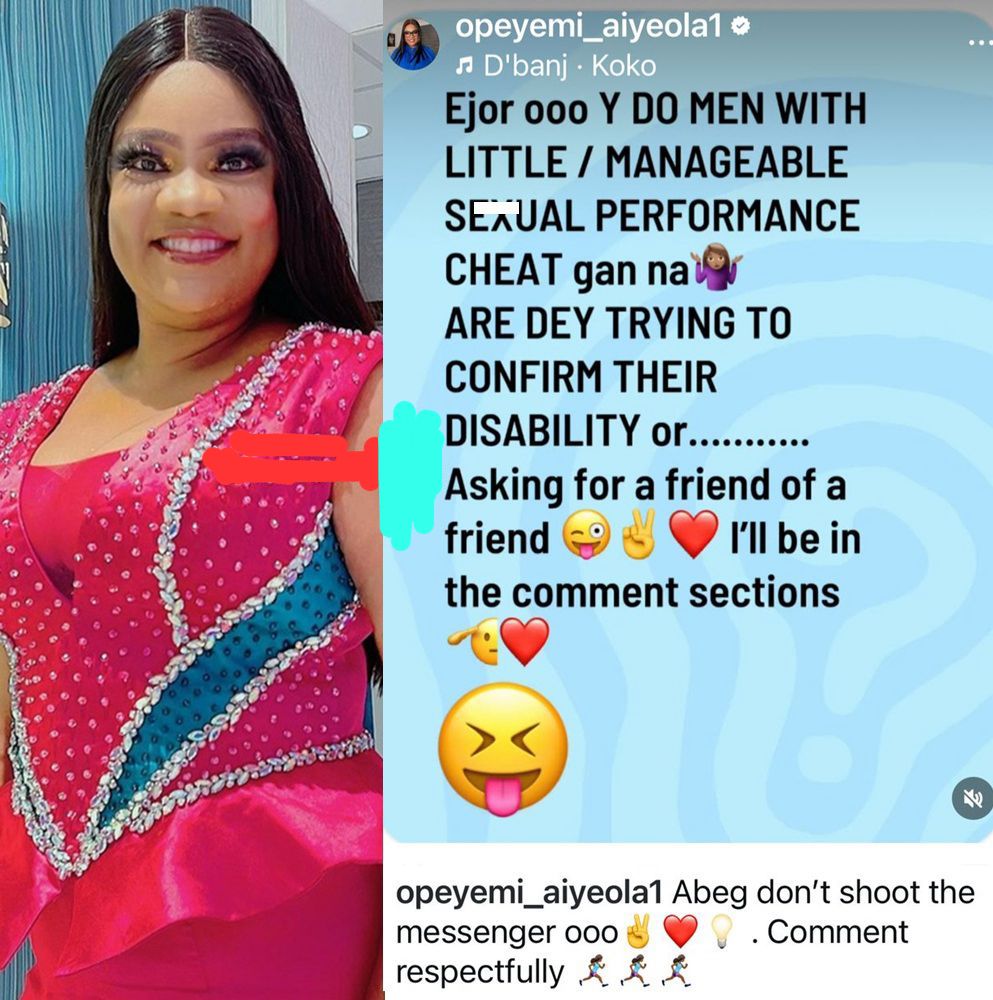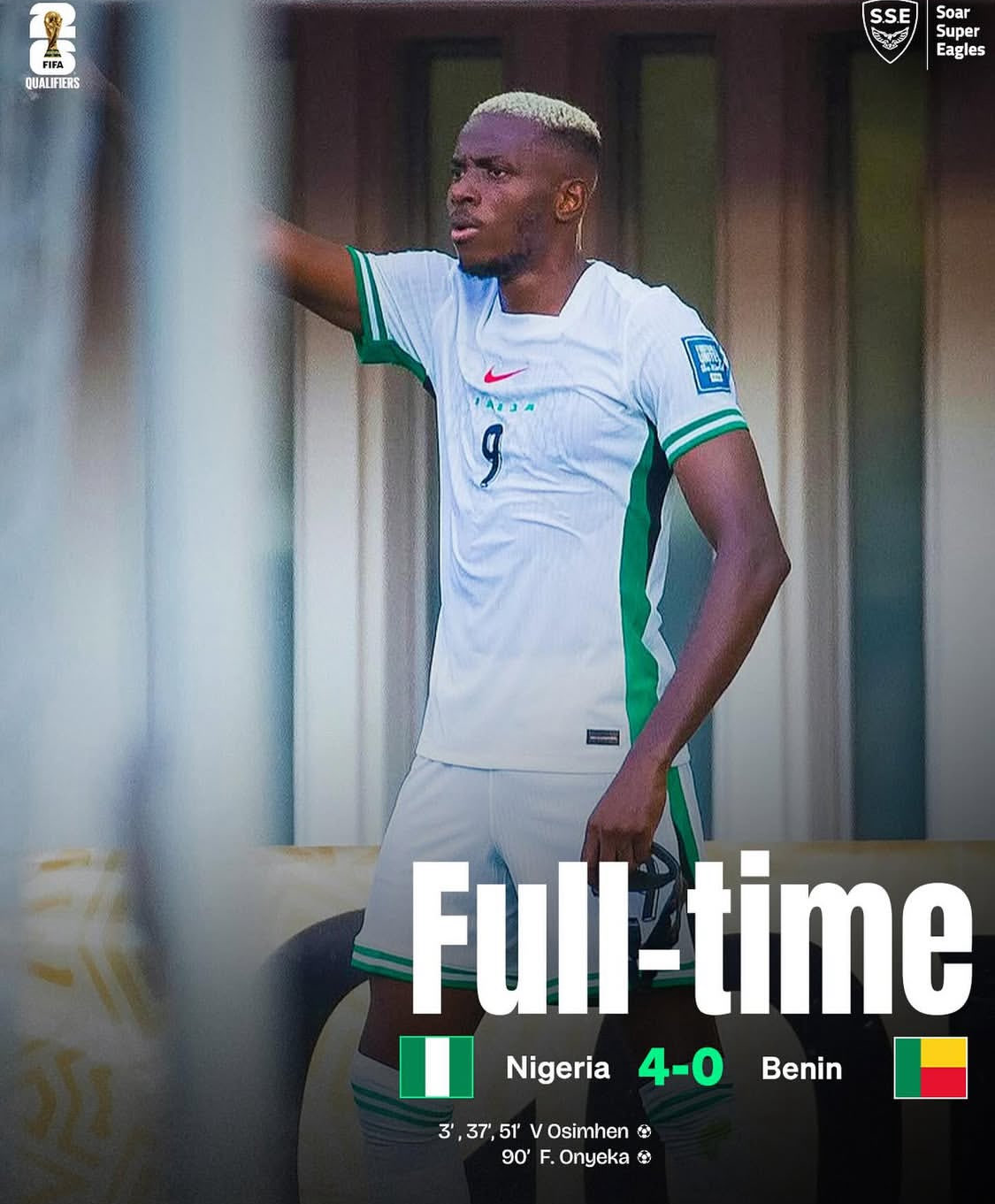
Opeyemi Aiyeola Sparks Online Frenzy as She Questions Why Men With Low Sexual Performance Still Cheat

Nollywood actress Opeyemi Aiyeola has stirred up heated discussions online after posing a bold and controversial question that has many talking. Taking to her verified Instagram account, the actress shared a post that reads like a humorous jab but touches on a deeper social issue that resonates with countless relationships: “Why do men with little/manageable sexual performance still cheat?” Her rhetorical and partly sarcastic inquiry has since gone viral, igniting reactions across social media platforms and prompting debates about infidelity, masculinity, and self-awareness in romantic partnerships.
The post, which includes a reference to popular Nigerian singer D’banj’s iconic phrase “Koko,” reads: “Ejor ooo, why do men with little/manageable sexual performance cheat gan na? Are they trying to confirm their disability or... Asking for a friend of a friend. I’ll be in the comment sections.” She ended the post with a playful disclaimer: “Abeg don't shoot the messenger ooo... respectfully.” Though her tone was light and her language playful, the topic she raised is anything but trivial.
Opeyemi’s comment, draped in sarcasm and classic Naija humor, instantly sparked intense reactions from fans and followers alike. Within minutes, people flooded her comment section with their opinions. Some praised her courage for saying what many have often thought but were too afraid to say. Others accused her of body shaming or poking fun at a sensitive topic. However, one thing is clear—her question struck a nerve and opened the floodgates to a conversation that cuts across gender, age, and relationship status.
In a society where traditional masculinity often centers around sexual prowess and dominance, the idea that a man could be underperforming in bed yet still be unfaithful feels contradictory and, for many, deeply ironic. For women who have been on the receiving end of both poor sexual satisfaction and infidelity, Opeyemi’s post reads like a public outcry on their behalf—a brutally honest frustration that calls into question the hypocrisy of certain male behaviors in relationships.
The online discourse quickly spilled over to Twitter, TikTok, and Facebook, with users sharing personal stories, memes, and even polls. Some argued that cheating isn’t always about sex and that for some men, it’s more about ego, conquest, or emotional voids. Others clapped back at this justification, asking why men who clearly aren’t “delivering the goods” feel emboldened enough to seek attention elsewhere instead of working on their existing relationship or improving their sexual performance.
A few men joined the conversation to defend their gender, suggesting that the issue isn’t as black and white as it seems. Some admitted that shame or denial about their performance could be a contributing factor to their unfaithfulness—they cheat to escape the judgment they might feel at home. Others simply brushed off the post as a joke, insisting that not every comment online needs to be taken so seriously. But for many women, the post became a rallying cry—a moment to share their truths and demand accountability.
The debate touches on broader issues that extend beyond the bedroom. It calls attention to the lack of honest communication in relationships, the stigma surrounding male sexual dysfunction, and the unspoken pressures women face to stay loyal to partners who may not be meeting their emotional or physical needs. In many ways, Opeyemi's post is not just a shade; it's a spotlight on the quiet struggles that often go unaddressed in romantic partnerships.
Though some might accuse her of airing private matters in public or stirring controversy for attention, Opeyemi Aiyeola is no stranger to using her platform to speak out. Over the years, she’s developed a reputation for being forthright and candid, often using her social media space to spark thoughtful—if sometimes uncomfortable—conversations about family, womanhood, and society. This latest post only reinforces her role as a social commentator unafraid to tackle taboo topics.
It also raises the question: why are men with sexual shortcomings not more introspective? Why do some continue to step out of their relationships when they have unresolved issues in their own bedrooms? Is it an act of denial? A bid to validate their masculinity? Or, as Opeyemi cheekily suggests, a strange attempt to “confirm their disability”?
As expected, the actress has not responded to the firestorm beyond her initial post. Instead, she promised to “be in the comment sections,” likely watching as the conversation unfolds. Whether or not she will offer more insight or clarification remains to be seen, but what’s certain is that she’s already achieved her goal—getting people to talk.
In a culture where many are hesitant to discuss sexual health and fidelity openly, particularly from a woman’s point of view, Opeyemi’s comment serves as both satire and social critique. It forces a reckoning with uncomfortable truths and highlights the double standards that continue to persist in modern relationships. Whether viewed as a joke, a jab, or a justified critique, her words carry weight and are now part of a broader conversation about honesty, expectations, and mutual satisfaction in relationships.
One Instagram user aptly summed it up in a comment: “If you know you’re not good in bed, at least be good in loyalty.” Others chimed in with personal testimonies of heartbreak and betrayal, while a few boldly tagged their exes in the post. Some medical professionals even joined in, using the opportunity to encourage men to seek help for sexual dysfunction instead of hiding behind toxic behaviors.
As the online community continues to debate, joke, and reflect, Opeyemi Aiyeola’s post stands as a perfect example of how a single question—served with a sprinkle of humor and boldness—can unlock a tidal wave of truth. And while some may try to deflect with laughter or defensiveness, the truth remains: when it comes to love, sex, and loyalty, performance isn’t everything, but honesty sure is.


